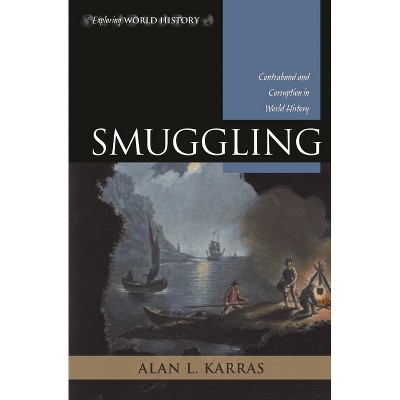Sponsored

Insatiable Appetite - (Exploring World History) by Richard P Tucker (Paperback)
$50.00
In Stock
Eligible for registries and wish lists
Sponsored
About this item
Highlights
- Now in a concise edition created expressly for students and general readers, this widely hailed study traces the transformation of the tropics in modern times.
- About the Author: Richard P. Tucker is adjunct professor of natural resources at the University of Michigan.
- 280 Pages
- Science, Environmental Science
- Series Name: Exploring World History
Description
About the Book
Now in a concise edition created expressly for students and general readers, this widely hailed study traces the transformation of the tropics in modern times. Exploring the central role of the United States in the ongoing devastation of tropical lands, Richard P. Tucker highl...Book Synopsis
Now in a concise edition created expressly for students and general readers, this widely hailed study traces the transformation of the tropics in modern times. Exploring the central role of the United States in the ongoing devastation of tropical lands, Richard P. Tucker highlights the unrelenting pressure caused by the demands of U.S. consumerism. The forced domestication of varied natural systems ultimately led to a devastating decline in biodiversity. The author brings his analysis to life with a series of vivid case studies of sugar, bananas, coffee, rubber, beef, and timber--each a virtual empire in itself. All readers who are interested in environmental degradation and its links to the world economy will be enlightened by this nuanced history.From the Back Cover
"This is a fascinating book. Tucker draws together an amazing amount of material to demonstrate how the U.S., through exploitation, consumption, and demand over the past several centuries, has had a major impact on the ecology of tropical landscapes. It is a sobering, much-needed wake-up call to those who view the tropics as an endless cornucopia of resources." --Charles M. Peters, The New York Botanical Garden"This well-written book presents a critical and much-needed new insight into an important problem." --Otto T. Solbrig, Bussey Professor of Biology, Harvard University
Review Quotes
[A] well-researched, thorough exploration of the US's role in resource exploitation in the tropics. . . . The book is important as more than a historical work because the driving forces behind large-scale corporate agricultural production and timber exploitation remain at work today. Highly recommended.
[The] subject is one that diplomatic historians have not even considered, and [Tucker] is far more international than . . . most environmental historians.
A comprehensive history of American roles in tropical agriculture and forestry . . . ranging from business and environmental history to anthropology, political science, and ecology.
I, and many other environmental scientists, will find it an invaluable source. . . . Too few [Americans] realize the enormous impacts citizens of the USA have because of their consumption of mundane items ranging from bananas and coffee to hamburgers, magazines and trophy homes. Richard Tucker's monumental book could help cure that ignorance.
Richard Tucker has drawn on a lifetime of scholarship to produce a critical account of the ways American companies and consumers have contributed to the environmental degradation of tropical countries. Anyone interested in the American impact on the third world will benefit from the insights and information in this wide-ranging and remarkable study. The abridged paperback will find a place in a variety of classes, bringing this important story to a broader audience.
This insightful work condenses and updates the original 2000 edition. Tucker explores the ecological destruction of tropical environments by US capitalists and corporations. . . . The author largely attributes tropical degradation to the insatiable appetite of the American consumer. Recommended.
This investigation creates space for big history, using consumption to bring economy and environment together.
This is a fascinating book. Tucker draws together an amazing amount of material to demonstrate how the United States, through exploitation, consumption, and demand over the past several centuries, has had a major impact on the ecology of tropical landscapes. It is a sobering, much-needed, wake-up call to those who view the tropics as an endless cornucopia of resources.
This well-written book presents a critical and much-needed new insight into an important problem.
About the Author
Richard P. Tucker is adjunct professor of natural resources at the University of Michigan.Dimensions (Overall): 8.9 Inches (H) x 6.17 Inches (W) x .79 Inches (D)
Weight: .92 Pounds
Suggested Age: 22 Years and Up
Number of Pages: 280
Genre: Science
Sub-Genre: Environmental Science
Series Title: Exploring World History
Publisher: Rowman & Littlefield Publishers
Format: Paperback
Author: Richard P Tucker
Language: English
Street Date: April 16, 2007
TCIN: 1004453285
UPC: 9780742553651
Item Number (DPCI): 247-12-5137
Origin: Made in the USA or Imported
If the item details aren’t accurate or complete, we want to know about it.
Shipping details
Estimated ship dimensions: 0.79 inches length x 6.17 inches width x 8.9 inches height
Estimated ship weight: 0.92 pounds
We regret that this item cannot be shipped to PO Boxes.
This item cannot be shipped to the following locations: American Samoa (see also separate entry under AS), Guam (see also separate entry under GU), Northern Mariana Islands, Puerto Rico (see also separate entry under PR), United States Minor Outlying Islands, Virgin Islands, U.S., APO/FPO
Return details
This item can be returned to any Target store or Target.com.
This item must be returned within 90 days of the date it was purchased in store, shipped, delivered by a Shipt shopper, or made ready for pickup.
See the return policy for complete information.

















